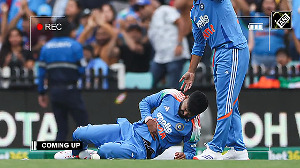The harsh punishment is part of a "Zero Tolerance" plan USA Track and Field hopes to implement next year, chief executive officer Craig Masback said.
Athletes also could be fined up to $100,000 if convicted of steroid use and their coaches could face similar fines.
Previously, athletes convicted of positive doping offences could be suspended for two years.
Masback said the proposed changes, which USATF hopes to enact at its December convention in Greensboro, North Carolina, would not be retroactive.
During a teleconference from his Indianapolis office, Masback also called for an emergency drugs in sports summit in Washington in the next two weeks.
He said representatives of the major sports leagues and organisations in the United States had been invited to attend.
He also called on the U.S. government to become more active in the catching of steroid traffickers and for more doping tests of U.S. athletes.
FOUR POSITIVES
Masback also announced for the first time that the A samples of four American athletes had tested positive for the previously undetectable steroid tetrahydrogestrinone (THG).
A growing scandal involving the designer steroid's use is threatening to rock not only international athletics, but U.S. professional sports as well.
"The situation in which we find ourselves is not a track and field problem, or even a baseball problem, it is an American problem with more than four percent of American high school seniors indicating they have used steroids in the last year," Masback said.
The fines and banishment proposals follow immense pressure by the International Olympic Committee (IOC) and U.S. Olympic Committee (USOC) on USATF to resolve problems relating to doping and athlete conduct.
The USOC said on Friday it was giving USATF one month to resolve the issues or face the possibility of de-certification or loss of its governing authority in the United States.
Masback said on Wednesday that the organisation had not done everything within its power to deal with the problems.
YOUNG CASE
The IOC and USOC are particularly upset at USATF for not turning over documents relating to the doping case of U.S. sprinter Jerome Young.
Young, the world 400-metre champion, won a gold medal at the Sydney Olympics by running an early round for the winning 4x400-metre relay team. He tested positive in 1999 for the banned steroid nandrolone but was cleared on appeal by a USATF panel.
USATF refused to name Young as the athlete whose case sparked an international controversy at the 2000 Games, but the USOC in September confirmed his name.
The IOC then requested that the International Association of Athletics Federations (IAAF), the sport's governing body, review the case.
On Wednesday Masback cited a January ruling by the Court of Arbitration in Sport (CAS) that USATF did not have to disclose documents about any doping cases from 1996 to 2000.
But he noted that a dialogue is underway between USATF and USOC regarding the case.
"We welcome the dialogue with the USOC and if there is a resolution to be had we welcome that as well," he said.







